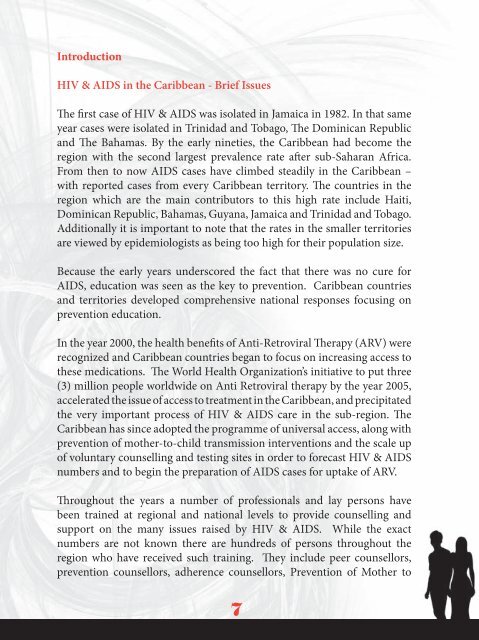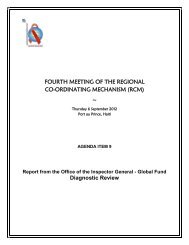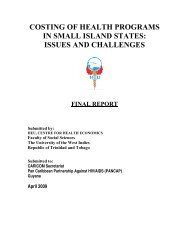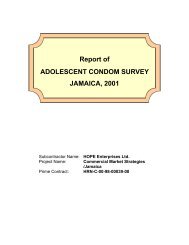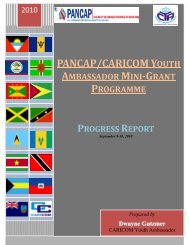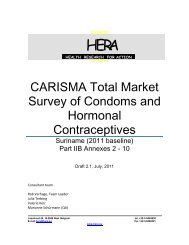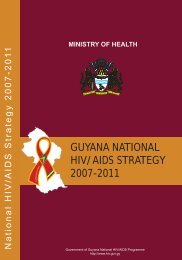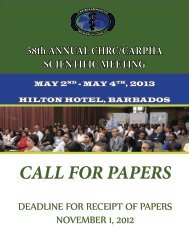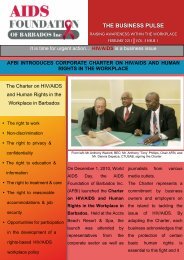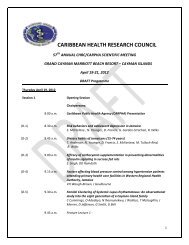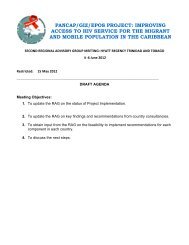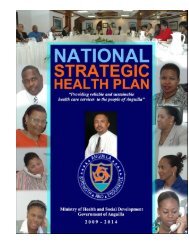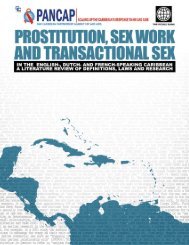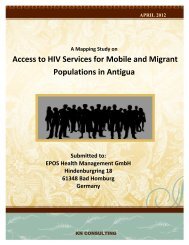Code of Practice for Psycho-Social Practitioners - PANCAP- Pan ...
Code of Practice for Psycho-Social Practitioners - PANCAP- Pan ...
Code of Practice for Psycho-Social Practitioners - PANCAP- Pan ...
You also want an ePaper? Increase the reach of your titles
YUMPU automatically turns print PDFs into web optimized ePapers that Google loves.
Introduction<br />
HIV & AIDS in the Caribbean - Brief Issues<br />
The first case <strong>of</strong> HIV & AIDS was isolated in Jamaica in 1982. In that same<br />
year cases were isolated in Trinidad and Tobago, The Dominican Republic<br />
and The Bahamas. By the early nineties, the Caribbean had become the<br />
region with the second largest prevalence rate after sub-Saharan Africa.<br />
From then to now AIDS cases have climbed steadily in the Caribbean –<br />
with reported cases from every Caribbean territory. The countries in the<br />
region which are the main contributors to this high rate include Haiti,<br />
Dominican Republic, Bahamas, Guyana, Jamaica and Trinidad and Tobago.<br />
Additionally it is important to note that the rates in the smaller territories<br />
are viewed by epidemiologists as being too high <strong>for</strong> their population size.<br />
Because the early years underscored the fact that there was no cure <strong>for</strong><br />
AIDS, education was seen as the key to prevention. Caribbean countries<br />
and territories developed comprehensive national responses focusing on<br />
prevention education.<br />
In the year 2000, the health benefits <strong>of</strong> Anti-Retroviral Therapy (ARV) were<br />
recognized and Caribbean countries began to focus on increasing access to<br />
these medications. The World Health Organization’s initiative to put three<br />
(3) million people worldwide on Anti Retroviral therapy by the year 2005,<br />
accelerated the issue <strong>of</strong> access to treatment in the Caribbean, and precipitated<br />
the very important process <strong>of</strong> HIV & AIDS care in the sub-region. The<br />
Caribbean has since adopted the programme <strong>of</strong> universal access, along with<br />
prevention <strong>of</strong> mother-to-child transmission interventions and the scale up<br />
<strong>of</strong> voluntary counselling and testing sites in order to <strong>for</strong>ecast HIV & AIDS<br />
numbers and to begin the preparation <strong>of</strong> AIDS cases <strong>for</strong> uptake <strong>of</strong> ARV.<br />
Throughout the years a number <strong>of</strong> pr<strong>of</strong>essionals and lay persons have<br />
been trained at regional and national levels to provide counselling and<br />
support on the many issues raised by HIV & AIDS. While the exact<br />
numbers are not known there are hundreds <strong>of</strong> persons throughout the<br />
region who have received such training. They include peer counsellors,<br />
prevention counsellors, adherence counsellors, Prevention <strong>of</strong> Mother to<br />
7


